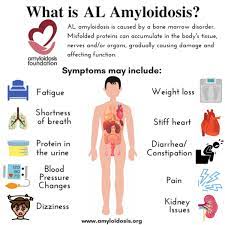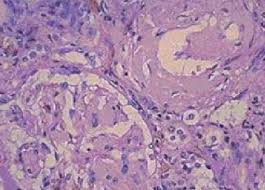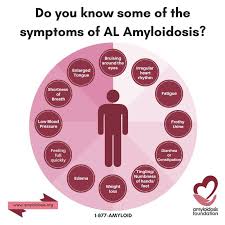Amyloidosis
Overview
Amyloidosis
(am-uh-loi-DO-sis) is a rare disease that occurs when an abnormal protein,
called amyloid, builds up in your organs and interferes with their normal
function.
Amyloid isn't normally found
in the body, but it can be formed from several different types of protein.
Organs that may be affected include the heart, kidneys, liver, spleen, nervous
system and digestive tract.
Some varieties of
amyloidosis occur in association with other diseases. These types may improve
with treatment of the underlying disease. Some varieties of amyloidosis may
lead to life-threatening organ failure.
Treatments may include
chemotherapy similar to that used to combat cancer. Your doctor may suggest
medications to reduce amyloid production and to control symptoms. Some people
may benefit from organ or stem cell transplant
Symptoms
Purpura around the eyes, a
sign of amyloidosis
You may not experience signs
and symptoms of amyloidosis until the condition is advanced. When signs and
symptoms are evident, they depend on which of your organs are affected.
Signs and symptoms of
amyloidosis may include:
Swelling of your ankles and
legs
Severe fatigue and weakness
Shortness of breath with minimal
exertion
Unable to lie flat in bed
due to shortness of breath
Numbness, tingling or pain
in your hands or feet, especially pain in your wrist (carpal tunnel syndrome)
Diarrhea, possibly with
blood, or constipation
Unintentional weight loss of
more than 10 pounds (4.5 kilograms)
An enlarged tongue, which
sometimes looks rippled around its edge
Skin changes, such as
thickening or easy bruising, and purplish patches around the eyes
An irregular heartbeat
Difficulty swallowing
When to see a doctor
See your doctor if you
persistently experience any of the signs or symptoms associated with
amyloidosis.
Causes
There are many different
types of amyloidosis. Some varieties are hereditary. Others are caused by
outside factors, such as inflammatory diseases or long-term dialysis. Many
types affect multiple organs, while others affect only one part of the body.
Subtypes of amyloidosis
include:
AL amyloidosis
(immunoglobulin light chain amyloidosis). The most common type of amyloidosis
in developed countries, AL amyloidosis is also called primary amyloidosis. It
usually affects the heart, kidneys, liver and nerves.
AA amyloidosis. Also known
as secondary amyloidosis, this variety is usually triggered by an inflammatory
disease, such as rheumatoid arthritis. Improved treatments for severe
inflammatory conditions have resulted in a sharp decline in the number of cases
of AA amyloidosis in developed countries. It most commonly affects the kidneys,
liver and spleen.
Hereditary amyloidosis
(familial amyloidosis). This inherited disorder often affects the nerves, heart
and kidneys. It most commonly happens when a protein made by your liver is
abnormal. This protein is called transthyretin (TTR).
Wild-type amyloidosis. This
variety of amyloidosis occurs when the TTR protein made by the liver is normal
but produces amyloid for unknown reasons. Formerly known as senile systemic
amyloidosis, wild-type amyloidosis tends to affect men over age 70 and
typically targets the heart. It can also cause carpal tunnel syndrome.
Localized amyloidosis. This
type of amyloidosis often has a better prognosis than the varieties that affect
multiple organ systems. Typical sites for localized amyloidosis include the
bladder, skin, throat or lungs. Correct diagnosis is important so that treatments
that affect the entire body can be avoided.
Risk factors
Factors that increase your
risk of amyloidosis include:
Age. Most people diagnosed
with amyloidosis are between ages 60 and 70, although earlier onset occurs.
Sex. Amyloidosis occurs more
commonly in men.
Other diseases. Having a
chronic infectious or inflammatory disease increases your risk of AA
amyloidosis.
Family history. Some types
of amyloidosis are hereditary.
Kidney dialysis. Dialysis
can't always remove large proteins from the blood. If you're on dialysis,
abnormal proteins can build up in your blood and eventually be deposited in
tissue. This condition is less common with more modern dialysis techniques.
Race. People of African
descent appear to be at higher risk of carrying a genetic mutation associated
with a type of amyloidosis that can harm the heart.
Complications
The potential complications
of amyloidosis depend on which organs the amyloid deposits affect. Amyloidosis
can seriously damage your:
Heart. Amyloid reduces your
heart's ability to fill with blood between heartbeats. Less blood is pumped
with each beat, and you may experience shortness of breath. If amyloidosis
affects your heart's electrical system, your heart rhythm may be disturbed.
Amyloid-related heart problems can become life-threatening.
Kidneys. Amyloid can harm
the kidneys' filtering system, causing protein to leak from your blood into
your urine. The kidneys' ability to remove waste products from your body is
lowered, which may eventually lead to kidney failure and the need for dialysis.
Nervous system. You may
experience pain, numbness or tingling of your fingers or numbness, lack of
feeling or a burning sensation in your toes or the soles of your feet. If
amyloid affects the nerves that control your bowel function, you may experience
periods of alternating constipation and diarrhea. If it affects the nerves that
control blood pressure, you may feel faint after standing up too quickly.
Diagnosis & treatment
Show references
Related
Enlarged tongue
Purpura around the eyes
Associated Procedures
Bone marrow transplant
Liver transplant
Urinalysis
Products & Service
Amyloidosis
Symptoms & causes
Diagnosis & treatment
Doctors & departments
Jan Ricks Jennings, MHA, LFACHE
Senior Consultant
Senior Management Resources,
LLC
JanJenningsBlog.Blogspot.com
412.913.0636 Cell
724.733.0509 Office
March 11, 2022




No comments:
Post a Comment